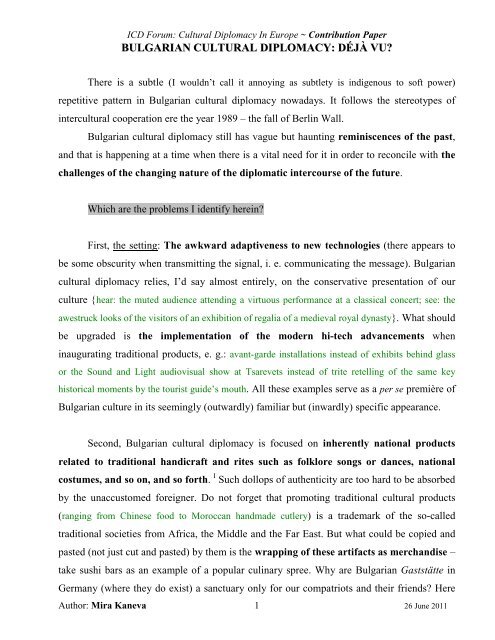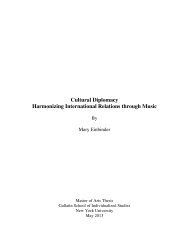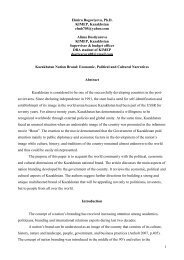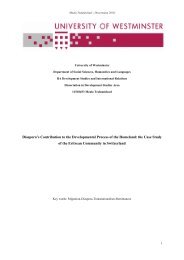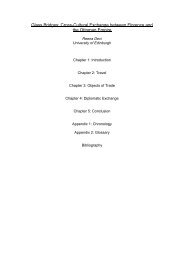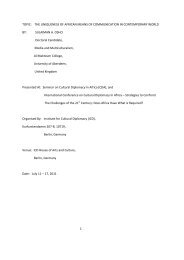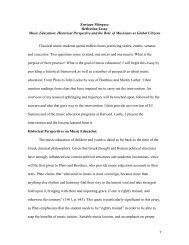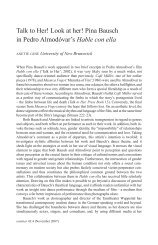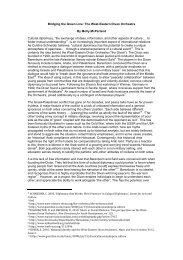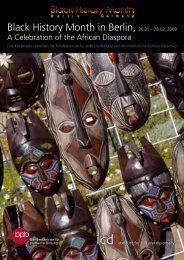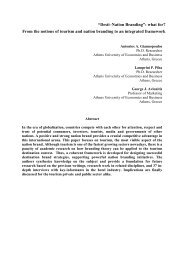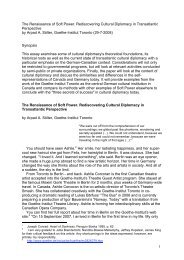BULGARIAN CULTURAL DIPLOMACY: DÉJÀ VU? - Institute for ...
BULGARIAN CULTURAL DIPLOMACY: DÉJÀ VU? - Institute for ...
BULGARIAN CULTURAL DIPLOMACY: DÉJÀ VU? - Institute for ...
Create successful ePaper yourself
Turn your PDF publications into a flip-book with our unique Google optimized e-Paper software.
ICD Forum: Cultural Diplomacy In Europe ~ Contribution Paper<br />
<strong>BULGARIAN</strong> <strong>CULTURAL</strong> <strong>DIPLOMACY</strong>: <strong>DÉJÀ</strong> <strong>VU</strong>?<br />
There is a subtle (I wouldn’t call it annoying as subtlety is indigenous to soft power)<br />
repetitive pattern in Bulgarian cultural diplomacy nowadays. It follows the stereotypes of<br />
intercultural cooperation ere the year 1989 – the fall of Berlin Wall.<br />
Bulgarian cultural diplomacy still has vague but haunting reminiscences of the past,<br />
and that is happening at a time when there is a vital need <strong>for</strong> it in order to reconcile with the<br />
challenges of the changing nature of the diplomatic intercourse of the future.<br />
Which are the problems I identify herein?<br />
First, the setting: The awkward adaptiveness to new technologies (there appears to<br />
be some obscurity when transmitting the signal, i. e. communicating the message). Bulgarian<br />
cultural diplomacy relies, I’d say almost entirely, on the conservative presentation of our<br />
culture {hear: the muted audience attending a virtuous per<strong>for</strong>mance at a classical concert; see: the<br />
awestruck looks of the visitors of an exhibition of regalia of a medieval royal dynasty}. What should<br />
be upgraded is the implementation of the modern hi-tech advancements when<br />
inaugurating traditional products, e. g.: avant-garde installations instead of exhibits behind glass<br />
or the Sound and Light audiovisual show at Tsarevets instead of trite retelling of the same key<br />
historical moments by the tourist guide’s mouth. All these examples serve as a per se première of<br />
Bulgarian culture in its seemingly (outwardly) familiar but (inwardly) specific appearance.<br />
Second, Bulgarian cultural diplomacy is focused on inherently national products<br />
related to traditional handicraft and rites such as folklore songs or dances, national<br />
costumes, and so on, and so <strong>for</strong>th. I Such dollops of authenticity are too hard to be absorbed<br />
by the unaccustomed <strong>for</strong>eigner. Do not <strong>for</strong>get that promoting traditional cultural products<br />
(ranging from Chinese food to Moroccan handmade cutlery) is a trademark of the so-called<br />
traditional societies from Africa, the Middle and the Far East. But what could be copied and<br />
pasted (not just cut and pasted) by them is the wrapping of these artifacts as merchandise –<br />
take sushi bars as an example of a popular culinary spree. Why are Bulgarian Gaststätte in<br />
Germany (where they do exist) a sanctuary only <strong>for</strong> our compatriots and their friends? Here<br />
Author: Mira Kaneva 1<br />
26 June 2011
ICD Forum: Cultural Diplomacy In Europe ~ Contribution Paper<br />
comes the issue of political marketing whose paragon has recently become Incredible India.<br />
The attractive incorporation of highly original objects into mass production whets the appetite<br />
of the average consumer – a sui generis apératif. It proves out that the hegemony of the<br />
Occident (seen by the anthropologist Claude Lévi-Strauss II ) is no longer the case since<br />
the East is the one that lures the West. Thus, the role of Bulgarian cultural diplomacy can be<br />
seen as an alter ego to EU cultural diplomacy (Balkan, Eastern European, whatsitsname).<br />
Yes, the West continues to take part in the radical dépaysement of Oriental cultures (beyond<br />
the borders of the Protestant-Catholic Latin-alphabet writing member states). But there is a<br />
major difference – after the researcher has passed the test of otherness (i. e. revelled in the<br />
<strong>for</strong>eign culture) and verified one’s capacity to accept it (a process of initiation), one goes on<br />
living in this new multicultural context (a process of internalising). The reason why that<br />
happens is that the soft power of non-Western cultures has the same or even greater impact<br />
than that of Western ones. So, traditional societies have the unique opportunity to<br />
preserve their ethnocentric characteristics by selling them in the <strong>for</strong>m of a typical mass<br />
culture output. {cf.: archeological sightseeing of monasteries provokes a massive Orthodox<br />
Christian pilgrims’ influx III }.<br />
Third, the plot: One drawback concerning the contents of the international presentation<br />
of Bulgarian culture is the constant reference to its communist past. Wielding soft power<br />
means neither a literal continuation of a retrograde <strong>for</strong>eign policy (chewing over and over<br />
again the ideological pattern of the past IV ) nor a negation such as the hefty anti-communist<br />
rhetoric of emigrants’ memoirs. V In comparison to Germany where the process of<br />
“Denazifikation” of the past has been successfully brought to an end, the nostalgia <strong>for</strong> the<br />
communist period in Bulgaria is only digested with difficulty. A fairly interesting<br />
recapitulation of the collective memory with a certain “gangster flavour” offers the film “Zift”<br />
after Vladislav Todorov’s novel VI . Such a scenic per<strong>for</strong>mance of the visual arts gives civil<br />
society the chance <strong>for</strong> an active participation both as a director and as a scriptwriter (and<br />
arises in between the question of public-private collaboration) in conducting cultural<br />
diplomacy. Thus, we see the constructivist school of thought (à la Nicholas Onuf VII )<br />
certifying its thesis that people make society and society makes people. Or: culture is a<br />
constructed phenomenon serving certain (incl. political) objectives.<br />
Author: Mira Kaneva 2<br />
26 June 2011
ICD Forum: Cultural Diplomacy In Europe ~ Contribution Paper<br />
Cultural diplomacy there<strong>for</strong>e might be presented as a 3-D cinema in view of the above<br />
mentioned films. Cultural diplomatic ties, as the Special Assistant to the Secretary of State <strong>for</strong><br />
the Coordination of International Educational and Cultural Relations Robert H. Thayer<br />
puts it back in 1959, are based on mutual understanding. VIII Mutual understanding suggests<br />
interaction; in other words a two-way street, not the one-way track of diplomatic ties<br />
between representatives at a governmental level. It also means getting one’s national<br />
images across and delivering one’s community narrative in such a convincing way that they<br />
are taken in by the interlocutor (the other country’s society). Insight into other countries’<br />
culture, not a brief zapping through the channels, is a must <strong>for</strong> an effective cultural<br />
diplomacy.<br />
And the end: the final message is… To be continued via the linkage between culture<br />
and science. The collective interpretation of cultural diplomacy among an epistemic<br />
community (such as the ICD) is possible at such <strong>for</strong>ums as the one currently held.<br />
I<br />
Ekaterina Dotscheva “Metamorphosen des Klassischen”, Kultura-Heft 26 (2553), 10. Juli 2009; In: Medienecho<br />
Auswahl, Goethe-Institut Bulgarien 2009-2010, S. 65<br />
II<br />
“Structural Anthropology”, cit. in: Marcel Hénaff “Claude Lévi-Strauss and the Making of Structural Anthropology”,<br />
University of Minnessota Press, 1998, pp. 22-23<br />
III<br />
http://online.wsj.com/article/SB10001424052748704216804575423673016971944.html<br />
Bulgaria Looks to John the Baptist to Resurrect Flagging Economy: Archeological Find Promises Fame, Tourists;<br />
Questions Remain Over Relics' Authenticity by Joe Parkinson; In: Wall Street Journal, August 13, 2010<br />
IV Cf.: The controversial and clichéd remake of childhood years during the “regime” in the Prize-winning (Venice<br />
Festival) film “Goodbye, Mama”; In: 24 hours, May 9, 2011<br />
http://www.24chasa.bg/Article.asp?ArticleId=884407<br />
V Cf. Anti-Bulgarian “orchestrated” hatred in Sybille Levitscharov’s Prize-winning book “Apostolov” (Leipziger<br />
Buchmesse, 2009); In: Bulgarische Armee, Art Linie, 23. Oktober, 2009; In: Medienecho Auswahl, Goethe-Institut<br />
Bulgarien 2009-2010, S. 93<br />
VI<br />
http://www.dw-world.de/dw/article/0,,14921766,00.html<br />
“Das Oxymoron Bulgarische Kulturpolitik”, Interview mit Vladislav Todorov, In: Deutsche Welle”, 19. 03. 2011<br />
VII<br />
“Constructivism: A User’s Manual”; In: “International Relations In a Constructed World” by V. Kubálková et al.<br />
(eds.), M. E. Sharpe Inc., 1998, p. 59<br />
VIII<br />
“Cultural Diplomacy: Seeing is Believing”; In: Vital Speeches of the Day, delivered at the University of Maine,<br />
August 10, 1959, pp. 740-744.<br />
Author: Mira Kaneva 3<br />
26 June 2011


